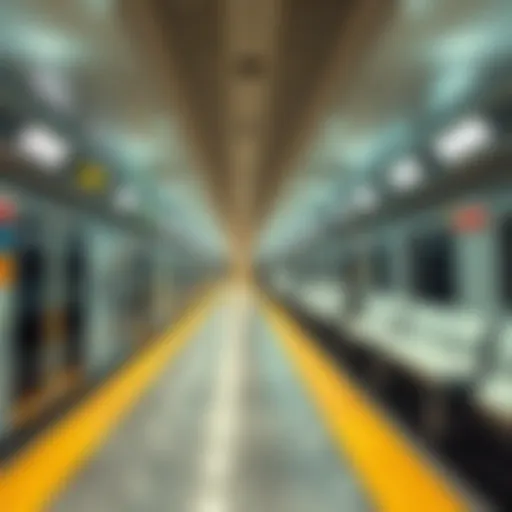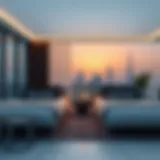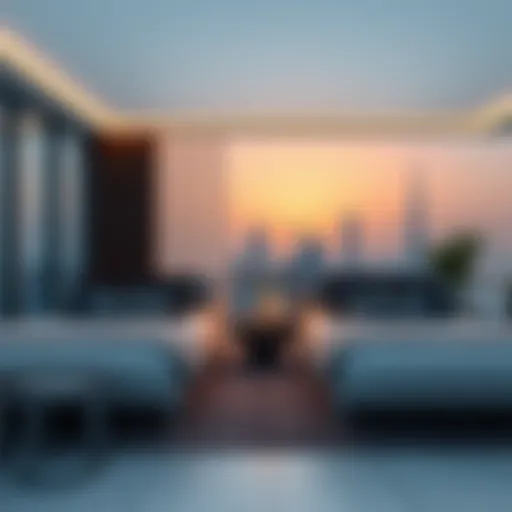Exploring the Intricacies of Dubai's Society
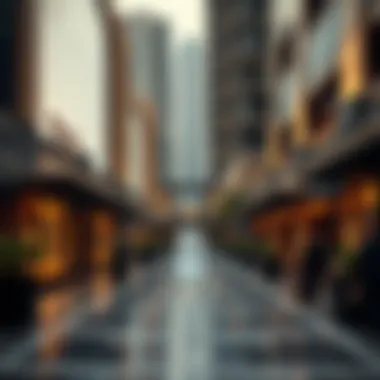

Intro
Dubai is not just a city; it’s a tapestry woven from countless threads of culture, history, and modern aspirations. Over the years, it has transitioned from a modest fishing village into a bustling metropolis recognized worldwide for its skyscrapers and luxury lifestyle. As such, understanding the intricate fabric of Dubai’s society is essential for anyone who wants to navigate its real estate market and lifestyle dynamics.
The current social landscape of Dubai is a reflection of its diverse population, which includes a potpourri of expatriates from different corners of the globe. This cosmopolitan blend fosters a unique environment where various traditions confront modern ways of living, leading to a dynamic yet complex social structure. The city not only thrives on its past but also constantly adapts, making it a true confluence of the old and the new.
In this article, we will unfold several key areas:
- Market Trends: Analyzing the current real estate landscape and notable property price trends.
- Investment Opportunities: Identifying high-return areas and upcoming developments in Dubai.
By delving into each of these aspects, we aim to provide a thorough understanding of how the social structure of Dubai is intricately linked to its economy, particularly its real estate market. This, in turn, offers investors, homeowners, and real estate analysts invaluable insights into the challenges and opportunities that lie ahead in one of the world's most vibrant cities.
Intro to Dubai's Society
The society of Dubai stands as a fascinating case that embodies the integration of diverse cultures and rapid advancements, making it worthy of exploration. In recent decades, this desert city has transformed into a global hub, attracting individuals from various backgrounds, lifestyles, and professional arenas. Understanding the complexities of Dubai's social fabric provides invaluable insights into its real estate landscape and consumer behavior. With a bold infrastructure and a lifestyle that reflects a blend of historic traditions and contemporary living, it's essential to appreciate how each aspect connects.
Through the lens of its society, we can better comprehend the driving forces behind economic growth and community dynamics. The city's robust population, a mix of both locals and expatriates, can significantly influence market trends, demand for housing, and the overall atmosphere of metro life. In this overview, we delve into the historical context and geographical influences that lay the groundwork for Dubai's unique society, shaping the lives of its inhabitants and the marketplace.
Historical Context
Dubai’s history is multifaceted, intertwining trade routes and cultural exchanges over centuries. The roots of this city trace back to the late 18th century, when it began as a modest fishing village. It was significant due to its strategic location along the Persian Gulf. By the 1930s, the introduction of oil exploration marked a turning point, ushering in a wave of modernization and development. This was not just about financial gain but a transformation of daily life and aspirations.
In the following decades, Dubai embarked on ambitious projects that would push it from a regional player to a global one. The establishment of free trade zones and significant investments in infrastructure, such as the Burj Khalifa and sprawling malls, attracted countless expatriates. The seeds planted during this time have blossomed into a highly diverse society, where over 80% of the residents hail from countries outside the UAE. This historical trajectory underlines the importance of Dubai’s socio-economic landscape and how it nurtures a culture of innovation.
Geographical Influences
Dubai’s geographical position plays a pivotal role in shaping its society. Nestled between the Arabian Desert and the Persian Gulf, it enjoys a strategic location that has historically been a crossroads for trade. This advantage allowed not just local merchants but incoming traders and travelers from around the world, fostering a melting pot of cultures.
Moreover, the strict desert climate has influenced lifestyles and economic activities. While the heat limits certain outdoor activities, it encouraged the development of shaded environments and air-conditioned spaces, leading to an urban design that melds indoor luxury with outdoor attractions.
Such geographical features also promote high-value tourism, further enhancing Dubai’s appeal as a destination for both leisure and business. As a result, its geographic advantages contribute significantly to social interactions, driving a culture that thrives on multiculturalism and economic collaboration.
Demographics of Dubai
Understanding the demographics of Dubai is essential for grasping the city's unique social structure. This information not only aids potential investors in evaluating market trends but also helps prospective homeowners and expat communities comprehend the tapestry of life in this bustling metropolis. As one navigates through Dubai’s landscape, it's evident that the population isn't just a statistical figure but a mix of vibrant cultures, traditions, and aspirations.
Population Statistics
Dubai's demographic statistics paint a compelling picture of a city in constant flux. As of recent data, the population stands at approximately three million, with more than 80% consisting of expatriates. This figure highlights the city’s appeal as a global hub for employment, education, and lifestyle.
- The average growth rate has hovered above 3% per year, largely fueled by immigration.
- Male residents typically outnumber females, with a ratio of roughly 2:1. This discrepancy stems from the influx of laborers primarily in sectors such as construction and hospitality.
- Over 200 nationalities coexist, creating a rich cultural mosaic that influences every aspect of life in Dubai.
These statistics illustrate how population dynamics affect not only social interactions but also local markets and housing demands.
Role of Expatriates
Expatriates form the backbone of Dubai’s workforce and society, shaping its character significantly. The job market in Dubai thrives due to the entrepreneurial spirit and diversity brought by these residents. Many expats move here seeking better opportunities and higher quality of life, contributing immensely to both the economy and cultural exchange.
- The integration of expatriates into society has led to vibrant community events that celebrate various cultures. Examples include:
- Diwali festivities by the Indian community
- Lunar New Year celebrations within the Chinese enclave
- Eid al-Fitr marked with fervor by families from across the Islamic world
This cultural melting pot fosters a spirit of collaboration and innovation, making Dubai a prime spot for businesses looking to expand their reach.
"The face of Dubai is continuously evolving, shaped by the dreams and ambitions of those who choose to make it their home."
Nonetheless, the reliance on expatriate labor also raises discussions about social integration and community cohesion. As the city continues to expand, balancing the needs of diverse populations with sustainable growth remains a challenge that authorities must address to ensure a harmonious society.
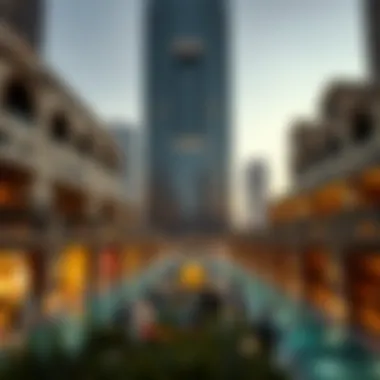

Cultural Diversity
Cultural diversity is the lifeblood of Dubai's society, enriching it with a mosaic of traditions, languages, and practices. The fabric of this city is interwoven with the threads of various cultures, each contributing to a lively atmosphere that shapes everyday life. This diversity brings not only vibrancy but also complexity, influencing social interactions, business dynamics, and the overall lifestyle of its inhabitants.
Understanding the importance of cultural diversity in Dubai helps investors and homeowners appreciate the city's unique character. It serves as a powerful draw for expatriates seeking opportunities, creating a marketplace that's as rich in culture as in commerce. Embracing cultural diversity can enhance one's social capital, making networking easier and more fruitful in both personal and professional realms.
Traditions and Customs
The traditions and customs held by the various ethnic groups play a crucial role in shaping Dubai's social environment. Emirati traditions, often steeped in Bedouin culture, stand alongside those from the Indian subcontinent, the Philippines, European nations, and others. This blend of customs makes for a colorful array of festivals throughout the year, from Eid celebrations to Diwali and Christmas events, where all community members can partake.
In daily life, interactions often reflect the respect for each other's traditions. For example, during Ramadan, it’s customary for the Muslim community to fast from dawn until sunset. Many expatriates join in to show solidarity, leading to communal iftar gatherings that foster unity. The variety of customs also influences the culinary scene, with restaurants offering an eclectic mix of cuisines, from spicy Indian dishes to Middle Eastern mezze, creating a feast for both the palate and the eyes.
Religious Influences
Religion plays a significant role in the cultural landscape of Dubai. As a Muslim-majority nation, Islamic practices inform various aspects of life, from the call to prayer echoing across the skyline to dress codes in public areas. However, Dubai's unique approach to governance allows for a harmonious coexistence of diverse faiths.
Churches, temples, and gurdwaras are interspersed throughout the city, highlighting the tolerance that characterizes Dubai. The annual Festival of Tolerance celebrates this religious plurality, inviting people to share their beliefs and practices. This framework of coexistence not only strengthens community bonds but also positions Dubai as a progressive center in the region, appealing to global investors.
Ethnic Communities
Dubai is home to a variety of ethnic communities, each bringing its language and cultural nuances. The demographic landscape is an intriguing patchwork; South Asians alone constitute about 40% of the population. This community’s influence extends into many facets of life, from business to education, presenting myriad opportunities for both cooperation and competition.
Additionally, the presence of Western expatriates has introduced various cultural elements, further diversifying the marketplace and contributing to a robust service sector. Networking and professional growth often occur in informal settings, where individuals from different ethnic backgrounds come together, reflecting Dubai's openness and adaptability.
The strength of Dubai’s societal structure lies in its ability to blend diverse cultures into a cohesive and thriving community, making it an alluring destination for investment and residence.
Through understanding and appreciating these ethnic communities, stakeholders can enhance engagement strategies, whether in real estate market positioning or community development initiatives. The realization of the intricate dance between these cultures can inspire innovative solutions to social challenges and spark new economic ventures.
Economic Landscape
Dubai's economy isn’t just a backdrop; it’s intricately woven into the very fabric of its society, making it a key player in this article. Understanding the economic landscape reveals how wealth creation, employment opportunities, and trade dynamics shape the daily lives of its residents. Moreover, the economic factors often dictate the social trends, influencing everything from housing demands to leisure activities. Expanding on this topic allows investors, homeowners, and analysts to grasp not just the numbers, but the stories behind them.
Sources of Economic Growth
Dubai’s growth can be traced back to several vital sources, each contributing to its current stature as a global hub.
- Oil and Gas Sector: Initially, Dubai's economy flourished because of oil. The discovery in the 1960s transformed it overnight into a luxurious oasis. Today, while oil revenues have declined due to global shifts, the groundwork it laid helped catalyze other industries.
- Tourism: The glittering skyline and sea of attractions like Burj Khalifa and The Palm Jumeirah make it a magnet for tourists. It’s not just the sights; events like the Dubai Shopping Festival draw millions, bolstering local businesses.
- Real Estate: This sector has seen meteoric rises and occasional dips. However, its consistent growth—fueled by international investors—signals an ever-evolving market that adapts to local and global trends.
- Trade and Logistics: Positioned as a strategic hub between the East and the West, Dubai’s ports and infrastructure support a robust trading framework. The Jebel Ali Port is one of the busiest in the world.
- Financial Services: Free zones and tax incentives have attracted financial institutions, making Dubai a financial centre of the region. The Dubai International Financial Centre (DIFC) stands as a testament to this sector's growth.
In terms of future projections, it is clear that Dubai is a phoenix, constantly reinventing itself. With efforts towards diversification, growth in technology and green energy are just around the corner.
Impact on Society
The ramifications of this economic growth are palpable across Dubai’s social landscape. As opportunities bloom, so do challenges, such as:
- Employment Creation: The burgeoning industries have led to a surge in job opportunities. From high-skilled positions in tech to hospitality roles, the job market reflects the city’s economic heartbeat.
- Wealth Disparity: While many flourish, income inequality is a looming shadow over much of the success. The divide is evident, with a significant portion of the population earning disparities varying widely depending on their field.
- Cultural Integration: The economic boom has fostered a melting pot of cultures. Expatriates from all corners of the globe converge here, bringing their traditions, prompting both cultural enrichment and, at times, friction.
- Urban Development: The economic vitality fuels urban sprawl, resulting in rapid construction and urbanization. High-end developments like the Dubai Marina illustrate the changing landscape, offering both luxury and modern lifestyle assets.
As Dubai marches further into the 21st century, the delicate balance between growth, equality, and cultural harmony will continue to define its societal fabric.
"In Dubai, the economic engine doesn’t just drive commerce; it steers societal dynamics, painting a picture of success tinged with challenges that need resolution."
For further insights and statistics on Dubai’s economic development, consider visiting useful resources such as Wikipedia or Britannica.
Understanding Dubai's economic landscape is not just about the figures, but about the lives they shape. Investors and residents alike should stay attuned to both the glitter and the shadows.
Urban Development and Social Change
Urban development in Dubai is a tale of rapid transformation, a narrative that speaks of soaring skyscrapers and sprawling housing complexes that seem to appear overnight. As the city expands, so does its societal fabric, interweaving various stakeholders, from local Emiratis to the vast population of expatriates. This dynamic interplay between development and social evolution is not just noteworthy; it has profound implications for the real estate sector and the lifestyle choices of residents.
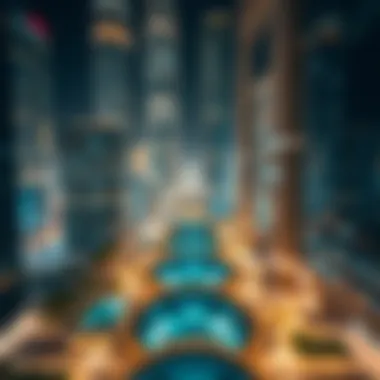

The unique aspect of urbanization in Dubai is its blend of tradition with modernity. While the city embraces cutting-edge architecture and technology, you can still find remnants of its heritage lurking in the quaint alleys of Al Fahidi or nestled within the bustling souks. This juxtaposition creates a rich backdrop for social interactivity, thereby fostering a multicultural environment.
Rapid Urbanization
Rapid urbanization in Dubai can be attributed to a few key factors:
- Economic Diversification: Transitioning from oil-reliant ventures to a more diversified economy has stimulated real estate growth.
- Foreign Investment: The Dubai property market has opened its doors wide, attracting investors globally, resulting in a surge of high-end developments.
- Strategic Location: As a gateway between East and West, Dubai offers many logistical advantages for international businesses, prompting high population influx.
This growth isn’t simply numerical; it influences the social structure and interactions among various demographic groups. Many professionals relocate for lucrative job opportunities, which in turn shapes the very fabric of neighborhood cultures. A residential area may initially attract tech professionals, while another may become a haven for hospitality workers, creating distinct social identities across the city.
As a direct consequence of rapid urbanization, issues such as infrastructure strain and affordable housing shortages emerge. Moreso, the demand for public services like transport, healthcare, and education escalates, presenting challenges that city planners must tackle immediately.
"Dubai’s rapid growth is more than just an architectural feat; it’s a social mosaic that reflects both aspirations and realities of its residents."
Housing Trends
With the urban environment evolving, housing trends in Dubai are equally fascinating. Initial surges in luxury developments have given way to a notable rise in diverse living options catering to a broader range of budgets:
- Luxury Developments: Towers equipped with world-class amenities remain in demand among affluent expatriates and investors.
- Affordable Housing Projects: The government is now increasingly focusing on creating budget-friendly housing to accommodate young professionals and families.
- Sustainable Communities: Eco-friendly projects like the Dubai Sustainable City aim to integrate environmental concerns into housing solutions, responding to global trends towards sustainability.
These trends resonate with varying lifestyle preferences, from the minimalist in search of functional spaces to families desiring community-centric residences. The availability of mixed-use developments also adds layers to how residents experience daily life; shops, restaurants, and recreational facilities are seamlessly integrated into living environments, enhancing convenience.
Lifestyle and Leisure
As Dubai rapidly evolves, its lifestyle and leisure offerings have taken center stage in forming the city's identity. The blend of cultural richness and modernity creates a vibrant scene that reflects the unique fabric of its society. Understanding this aspect is crucial for anyone interested in the Dubai real estate market, investors, or even new residents looking to immerse themselves in local life. Lifestyle and leisure activities not only enhance the quality of life for residents but also attract tourists, leading to significant economic implications.
Social Activities
Social activities in Dubai function as the thread that stitches together its diverse population. From traditional gatherings during Ramadan to modern networking events, there is no shortage of opportunities for residents to engage and connect.
- Cultural Festivals: Events like the Dubai Shopping Festival and the Dubai Art Season showcase local talent and nurture community spirit. Such festivities are not just for entertainment; they provide a platform for artists, vendors, and audiences to interact, promoting social cohesion.
- Community Engagement: Various neighborhoods host regular events, including fitness boot camps, family fun days, and art workshops. These gatherings encourage interaction among people from different backgrounds, bridging cultural gaps.
- Sports Clubs and Associations: Sports, both traditional and contemporary, play a significant role in social integration. Whether it’s a friendly cricket match in a park or an international football tournament, these activities cultivate a sense of belonging, fostering friendships and networks.
"Social activities in Dubai serve as a catalyst for cultural exchange and community growth, reflecting the city’s dynamic blend of tradition and modernity."
Entertainment Options
Dubai’s entertainment landscape is a melting pot of choices that cater to various tastes and preferences, making it one of the most sought-after destinations for leisure. The ever-expanding options contribute significantly to residents' lifestyle by enhancing their recreational experience.
- Shopping Malls and Outlets: The Mall of the Emirates and Dubai Mall are not mere shopping spaces. They host cinemas, ice rinks, and a myriad of restaurants, offering experiences that exceed simple consumerism. For investors in retail, these malls exemplify the thriving consumer culture.
- Theme Parks: Attractions like IMG Worlds of Adventure and Dubai Parks and Resorts cater to thrill-seekers and families alike, providing diverse leisure activities. They draw both locals and tourists, positively impacting local businesses.
- Nightlife and Dining: From world-class restaurants helmed by celebrity chefs to vibrant lounges and bars, Dubai has an eclectic nightlife scene. This aspect contributes significantly to how expatriates and locals socialize, further intertwining personal and business relationships.
In summary, lifestyle and leisure activities in Dubai illustrate much more than just recreational choices; they reveal underlying cultural dynamics and social structures. For potential investors and residents, recognizing the importance of these elements can guide strategies in navigating Dubai's unique social landscape.
Social Challenges
The intricacies of Dubai's society do not come without their fair share of social challenges. As a melting pot of cultures and backgrounds, this city grapples with issues that can significantly impact its community landscape. Understanding these social challenges is crucial for investors, homeowners, and analysts, as these dynamics can influence the real estate market and the overall well-being of residents. From the integration of expatriates to growing inequality, the social fabric of Dubai is in flux, demanding immediate attention and thoughtful action.
Integration of Expatriates
In Dubai, expatriates form a big part of the population, making integration a pressing challenge. Many incoming residents hail from various corners of the world, each bringing their unique heritages and expectations. Yet, settling down in a new country is no cakewalk. Language, cultural barriers, and differing social norms can hinder effective integration.
The benefits of a successful integration process are manifold:
- Economic Contributions: Expatriates often play critical roles in various sectors, from construction to healthcare. When they are well integrated into society, their contributions can ripple through the economy.
- Cultural Enrichment: A melting pot of ideas and traditions can lead to a vibrant social and cultural scene, enhancing community life. When cultures merge, they often create distinctive flavors of music, food, and art.
- Social Stability: A cohesive society that welcomes diverse cultures fosters social stability. It helps defuse tensions that can arise from misunderstandings or prejudices.
However, the challenges remain evident. Navigating legal frameworks, securing housing, and understanding local customs can be hurdles that many expatriates face. There are also instances of social isolation or discrimination that can hinder community bonding.
Inequality Issues


Despite the glamor often associated with Dubai, the reality is that inequality casts a long shadow. Wealth distribution is stark, and social stratification is evident in both opportunities and living conditions. The gap between the affluent and less fortunate can be jarring, leading to pockets of disenfranchisement amidst a backdrop of luxury.
The implications of these inequalities are concerning:
- Access to Services: Those with financial power often enjoy top-tier healthcare, education, and housing. In contrast, lower-income residents may struggle to access these essentials without facing exorbitant costs.
- Social Mobility: Economic disparity can severely limit social mobility for underprivileged groups. Young individuals born into lower-income families might find it difficult to break free from the cycle of poverty, stifling their potential.
- Community Cohesion: A divide within society can breed resentment and tensions, affecting community cohesion. A social structure built on inequality can lead to unrest and dissatisfaction, which impacts the overall quality of life.
The social challenges in Dubai are not merely obstacles; they are pivotal elements that call for strategic reforms and inclusive policies.
Future Prospects
The future of Dubai's society pulses with promise, unveiling a landscape brimming with potential that is pivotal to understand for investors, homeowners, and real estate professionals. As the city continues to evolve, the ongoingd dynamics of its social fabric are influenced by various factors, from sustainability practices to demographic shifts. Gaining insights into these trends can reveal opportunities and challenges within the market, which are paramount to making informed decisions.
Sustainability Initiatives
Dubai has taken noticeable strides towards becoming a sustainable city, and this initiative is reflective of global trends. The government actively promotes environmental responsibility, aligning with visions like Dubai's Clean Energy Strategy 2050. This roadmap aims to increase the contribution of clean energy to Dubai’s total energy mix to 75% by 2050. As a result, urban developments increasingly incorporate green architecture, eco-friendly materials, and energy-efficient technologies.
Various projects showcase this commitment. For instance, the Dubai Sustainable City provides a living example of how urban spaces can foster sustainability through smart design and renewable energy sources. Such initiatives not only respond to climate concerns but also appeal to a growing demographic of environmentally conscious buyers and renters.
- Prominent Projects:
- Dubai Sustainable City
- The Expo 2020 site, now a hub for innovation and sustainability
- Various skyscrapers employing green technology
Furthermore, sustainability is driving shifts in consumer preferences. Buyers increasingly seek properties that prioritize green certifications, reducing their carbon footprints. As investors in real estate consider these advanced practices, the potential for higher returns on investments escalates within the sustainable segments of the market.
"The future depends on what we do in the present." - Mahatma Gandhi
Expected Trends in Society
The expected trends in Dubai society are set to reshape the way life, work, and leisure intertwine. The city is not just a fast-paced metropolis; it’s turning into a leading hub for innovation and technology. The integration of smart city initiatives is a prime factor behind this transformative wave.
In the coming years, several trends are palpable:
- Increased Digitalization: As industries embrace technology, the demand for tech-savvy professionals is escalating. The rise of fintech and numerous tech startups cultivate a dynamic job market, appealing to young expatriates.
- Cultural Integration: The demographic composition will continue to diversify, fostering cross-cultural engagement. Initiatives that celebrate multicultural festivals and programs are likely to strengthen community bonds.
- Shifts in Lifestyle and Housing Demands: Young professionals are driving a demand for urban living. Consequently, mixed-use developments that combine residential, commercial, and recreational space will become more appealing to buyers.
The evolution of societal expectations will also dictate innovation in public services and urban infrastructure, paving the way for a more interconnected and seamless day-to-day experience. Anticipating these shifts aids stakeholders in tailoring their strategies to align with the preferences of future residents and convening a framework conducive to growth.
As Dubai strides toward a blended future of opportunity and sustainability, understanding these trends equips stakeholders with valuable insights into the complex fabric of society as it emerges.
End
In examining the complex societal structure of Dubai, the conclusion brings to light several key themes that resonate throughout the article. The evolution of Dubai's society is a testament to the seamless blending of various cultural and historical influences, reflecting its unique position as a global hub. The remarkable demographic makeup, powered largely by a significant expatriate population, plays a crucial role in shaping daily life and cultural exchanges within the city.
Understanding these dynamics is not just an academic exercise; it has real implications for various stakeholders, particularly in the realms of real estate and investments. By recognizing how Dubai's social fabric operates, investors can make informed decisions, whether they are looking to purchase property or invest in local businesses. The evolving landscape of sustainability initiatives and projected societal shifts offer insights into future opportunities and potential challenges.
Moreover, the unique interplay between tradition and modernity serves as a guiding principle for those looking to tap into Dubai's vibrant market. For homeowners and aspiring residents, grasping the nuances of local customs and social practices will enhance their living experience and integration into the community. In a city where the past coexists with the future, knowledge becomes not just power, but necessary for meaningful engagement in this dynamic society.
"Understanding the social fabric of Dubai is essential for navigating its real estate market effectively."
By synthesizing these insights, we can appreciate how Dubai’s societal complexities shape its identity and influence its trajectory in the global arena. As society continues to evolve, staying informed becomes crucial for anyone wishing to be part of its ongoing narrative.
Summary of Key Insights
- Cultural Blending: Dubai’s society is an intricate interplay of diverse cultures due to its global expatriate community. This diversity enriches the local customs and social interactions.
- Economic Drivers: The robust economy, primarily fueled by tourism, trade, and real estate, influences social structures and daily life for residents.
- Integration of Traditions: Despite rapid modernization, traditional values and customs remain integral to community interactions, emphasizing the importance of cultural heritage.
- Social Challenges: Issues such as inequality and the integration of expatriates present ongoing challenges that the city continues to address.
Implications for Real Estate Sector
The real estate sector in Dubai is closely intertwined with its social dynamics. Understanding the following aspects can facilitate better investment decisions:
- Market Demand Influenced by Expatriate Population: With a substantial number of foreign residents, housing demands fluctuate along with demographic trends. This signifies a potential opportunity for investors.
- Sustainable Developments: Initiatives aimed at sustainability are reshaping the landscape, offering innovative projects that appeal to environmentally conscious buyers and investors.
- Cultural Sensitivity in Development: Real estate ventures that respect and incorporate local traditions are more likely to foster community goodwill and ensure long-term success.
- Urban Development Trends: Rapid urbanization presents both challenges and opportunities, as cities adapt to changing demographics while promoting inclusive living spaces.
For investors, understanding how social dynamics affect real estate trends is essential. Staying attuned to the community's evolving needs can lead to smarter investments and enhance overall occupancy rates in developments.
For more information on Dubai’s real estate market, check the sources available at Wikipedia, Britannica, and local resources on government sites.
The insights provided here emphasize that an informed perspective on societal intricacies not only benefits investors and homeowners but also contributes to a more cohesive community fabric.









